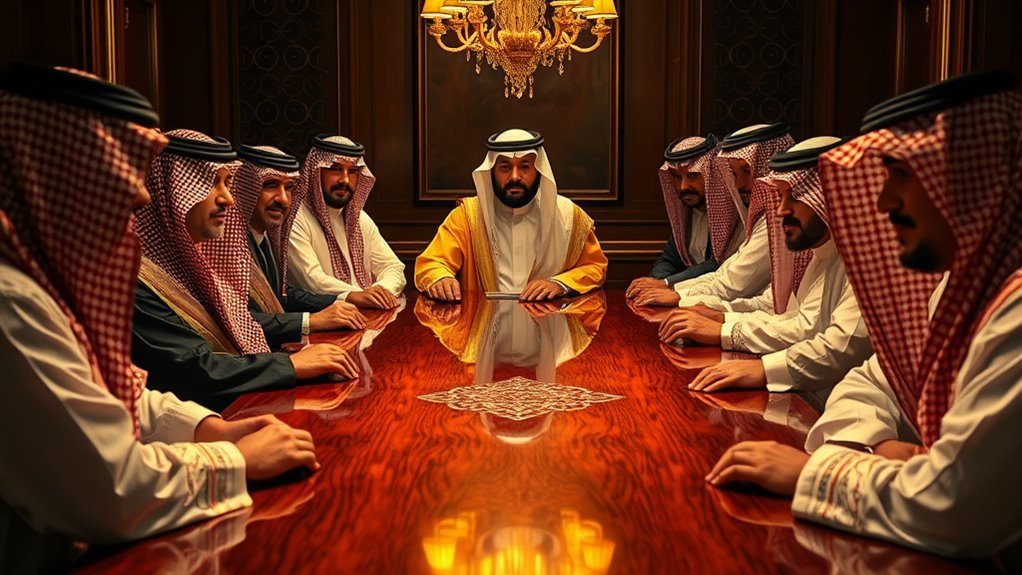You’re about to explore the significant impact Arab leaders have on global politics, and it’s intriguing. They’re shaping trade, diplomacy, and international policies, making their influence hard to ignore. What role do they play, exactly? As they navigate complex global landscapes, their strategic decisions echo across industries—including the world of entertainment and leisure. If you’re interested in high-stakes decision-making, explore Zoom Tunisia Saudi Arabia Casino Picks to see how calculated choices can lead to rewarding outcomes.

Economic Influence and Global Trade
As you consider the complex web of global trade, it’s clear that Arab leaders play a significant role in shaping the economic landscape.
They’re actively influencing trade policies, negotiating agreements, and investing in emerging markets. You’ll notice their impact on commodity prices, particularly oil, which affects economies worldwide.
Arab leaders are also diversifying their economies, investing in tech and innovation, and promoting entrepreneurship. Their strategic decisions are shaping the global economy, and it’s essential to understand their perspectives and motivations to navigate the complex world of international trade and commerce effectively.
Regional Conflict Resolution
While you navigate the complexities of global politics, Arab leaders’ roles in regional conflict resolution become increasingly crucial, given their unique position to broker peace and stability in volatile regions.
You’ll find that their involvement can make or break a conflict’s outcome. As you consider their influence, it’s clear that Arab leaders must balance competing interests and priorities.
They must facilitate dialogue, build trust, and foster cooperation to resolve conflicts effectively. By doing so, they can create a more stable and secure environment, which is essential for regional growth and development.
Their leadership is key to resolving regional conflicts.
Arab Leaders in International Organizations
When you examine the global political landscape, you’ll find that Arab leaders’ participation in international organizations is a critical factor in shaping the world’s response to pressing issues.
You see that their involvement in these organizations provides a platform for them to engage in dialogue and cooperation.
As you delve deeper, you notice that Arab leaders are increasingly taking on key roles in organizations like the UN and the Arab League.
You realize that their participation is crucial in addressing global challenges, and it’s essential to understand their perspectives and contributions to international organizations.
Shaping Global Policies and Agendas
Arab leaders’ active participation in international organizations has a direct impact on shaping global policies and agendas, and you’ll find that their influence is growing.
You’re witnessing a shift in the global landscape, where Arab leaders are taking a more proactive role. As you analyze their involvement, you’ll notice they’re not just reacting to global events, but also driving the conversation.
Their unique perspectives and experiences are shaping the discourse, and you’ll see that their contributions are becoming increasingly significant. You’re seeing a more nuanced approach to global policy-making, one that’s more inclusive and representative of diverse interests.
Strategic Alliances and Diplomatic Relations
You’re likely to find that the growing influence of Arab leaders in shaping global policies and agendas is closely tied to their ability to form strategic alliances and nurture diplomatic relations.
As you analyze their approaches, you’ll notice they’re building bridges with key global players. They’re forging partnerships that aren’t limited to economic interests, but also encompass cultural and security cooperation.
By doing so, they’re creating a network of relationships that help them navigate complex geopolitical landscapes.
You’ll see that these alliances aren’t static, but rather dynamic and adaptive, reflecting the evolving nature of global politics.
losing Remarks
You’ll recognize that Arab leaders’ strategic influence in global politics is pivotal, as they shape trade, diplomacy, and international agendas. Their unique perspectives foster dialogue, cooperation, and conflict resolution. By engaging in global forums, they ensure their voices are heard, ultimately shaping the future of international relations and global stability, isn’t it, as their role continues to evolve and expand.


